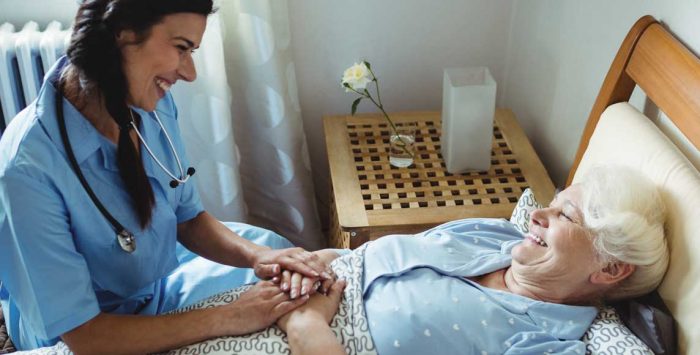The Centers for Disease Control and Prevention (CDC) reports that 90% of all healthcare costs in the United States are related to the treatment of chronic conditions. Many of these conditions are considered preventable and avoidable.
The good news for Medicare beneficiaries is that Medicare covers a number of preventive screening services that make early diagnosis and treatment possible.
What’s more, many beneficiaries can receive these screenings at low cost or no cost thanks to the Affordable Care Act, which eliminated cost sharing for a long list of Medicare preventive services.
Here’s a list of the most common preventive services; the criteria that allows many beneficiaries to receive them with no cost sharing; and an explanation of when beneficiaries may be required to pay the Medicare Part B deductible and coinsurance for these services.
Medicare vaccine coverage without cost sharing
Medicare Part B covers a number of vaccines without cost sharing if your healthcare provider accepts assignment, which means the provider agrees to charge you no more for their services than the Medicare-approved deductible and coinsurance amount.
Vaccines covered by Medicare Part B – with no cost sharing – include:
- Covid vaccine – The initial vaccine series protects against the SARS-CoV-2 virus.
- Covid booster – Boosters provide additional protection against the SARS-CoV-2 virus.
- Flu shot – This vaccination provides protection against the virus each influenza season.
- Pneumonia vaccine – Two different vaccine series protect against different strains of pneumonia.
- Hepatitis B vaccine – This vaccine series is available for people considered at risk for infection, specifically anyone who has diabetes, end-stage renal disease (kidney disease that requires dialysis or a transplant), hemophilia, or who lives with someone who has hepatitis B, or is a healthcare worker at high risk for exposure to the virus.
With the exception of the rabies vaccine and tetanus shots administered after an injury (see below), Medicare Part D covers other vaccines recommended by the Advisory Committee on Immunization Practices (ACIP). Thanks to the Inflation Reduction Act, there is no longer any cost-sharing for vaccines covered under Medicare Part D.
The following are vaccines covered by Medicare Part D.
- RSV vaccine protects against the respiratory syncytial virus which cause can cause respiratory tract infections, including pneumonia.
- Shingles vaccine protects against shingles, a painful condition caused by reactivation of the herpes zoster virus in people who previously had chicken pox.
- Tdap vaccine provides protection against both tetanus – more commonly known as “lockjaw” – and pertussis – also known as whooping cough.
For which vaccines does Medicare require coinsurance?
Medicare Part B covers certain vaccines only after you have had an exposure that increases your risk for infection. In these cases, you will be required to pay a 20% coinsurance.
- Rabies vaccine – administered after a bite by an animal infected with or suspected to be infected with rabies
- Tetanus vaccine – administered after a dirty puncture wound that is at risk for transmission of tetanus, (such as an animal bite or a rusty nail puncture)
Medicare wellness visits
Not everyone is aware of the many preventive services Medicare has to offer. Centers for Medicare & Medicaid Services (CMS) recognizes this and has provided opportunities for beneficiaries to learn about screenings and vaccinations during a visit with a healthcare provider.
- “Welcome to Medicare” preventive visit – Medicare covers a one-time introductory visit with a healthcare provider, which includes a review of your current health status, education and counseling about available preventive services, and referrals for other care if needed. You must use this visit within 12 months of signing up for Medicare Part B.
- “Annual Wellness Visit” – If you’ve had Medicare Part B for longer than 12 months, you can get a yearly wellness visit to develop or update a personalized prevention plan based on your current health and risk factors.
It is important to know that these wellness visits are intended to review your medical history and to plan for appropriate preventive care. These visits do not include a complete physical exam.
How does Medicare cover cancer screenings?
According to the American Cancer Society, as many as 2 million people in the United States will be diagnosed with cancer in 2024 alone. Detecting cancer earlier allows people to be treated sooner and can hopefully prevent complications and even deaths from the disease.
Whether or not you will pay cost sharing for any of these services depends upon whether the service is a screening test or a diagnostic test. Screening tests – performed on people who do not have signs or symptoms of disease – may not require cost sharing. Diagnostic services – performed when there are symptoms or abnormal findings, or more frequently than the recommended screening tests – typically require cost-sharing.
As an example, a patient who receives a mammogram performed for screening purposes would not have to pay cost sharing. However, a mammogram to evaluate a lump in that patient’s breast would be considered a diagnostic test – and would require cost sharing.
In a similar way, a colonoscopy or flexible sigmoidoscopy can be covered with no cost-sharing if performed at the screening intervals covered by Medicare. But if a polyp is found and removed, the patient will pay 15% of the Medicare-approved amount for the facility fee and the doctor’s services.
Medicare-covered preventive services that screen for cancer
Medicare Part B coverage includes preventive screening services such as:
- Colonoscopy. Considered by many to be the gold standard for colorectal cancer screening, colonoscopy is covered every 10 years for people at average risk (or four years after they have had a flexible sigmoidoscopy) or every two years for people at high risk. A colonoscopy is also covered as a screening test for anyone who has had abnormal stool studies. (See “other colon cancer screening below.”)
- Mammogram. The most effective screening tool for breast cancer is a mammogram although Medicare also covers a clinical breast exam with no cost sharing. Medicare covers a baseline mammogram for women between the ages of 35 and 39 and annually for women 40 and over.
- Other colon cancer screening. Colonoscopy is not the only way to screen for colon cancer. Medicare only covers the following studies if you’re at least 45 years old.
- Flexible sigmoidoscopy. Medicare covers this procedure every four years (or 10 years after a colonoscopy for people at low risk).
- Stool-based studies. Medicare beneficiaries can receive fecal occult blood testing with no cost-sharing once a year if they get a referral from their medical provider. Medicare will pay for a multi-targeted stool DNA test (i.e., Cologuard) every three years for any beneficiary between the ages of 45 and 85 who does not have symptoms and is at average risk for colon cancer.
- Barium enema. This study is intended for people who do not screen with a colonoscopy or flexible sigmoidoscopy. Medicare will cover the screening every four years for people at average risk and every two years for people at high risk. The Medicare Part B deductible does not apply to this screening, but patients must pay 20% coinsurance.
- Cervical and vaginal cancer screening. Medicare covers a Pap test and pelvic exam, conducted every two years for women at average risk and annually for women at high risk. Women between the ages of 30 and 65 also qualify for HPV screening with their Pap test every five years.
- Prostate cancer screening. Medicare covers an annual screening using a PSA blood test – which is covered in full – and a digital rectal exam, which requires the beneficiary to pay the Medicare Part B deductible and 20% coinsurance.
- Lung cancer screening. Medicare covers an annual screening with a low-dose CT scan for beneficiaries between the ages of 55 and 77 who do not have clinical signs of lung cancer, who have smoked within the past 15 years, and who have smoked at least 20 pack-years. (A pack year is the number of packs of cigarettes smoked per day multiplied by the number of years).
What other screenings are covered by Medicare?
Medicare Part B offers a number of other preventive care screenings. Here’s a list of the screenings, how they’re covered and whether you’ll be required to pay a deductible or coinsurance.
- Bone density test. Medicare covers in full a screening for osteoporosis every two years for women with estrogen deficiency (including menopause) and for anyone who is on long-term steroid medication, has primary hyperparathyroidism, or has had abnormal x-rays that shows high risk for osteoporosis. Also, when a beneficiary is treated for osteoporosis, Medicare will cover monitoring of the patient’s response to that treatment every two years.
- Glaucoma testing. Medicare covers a screening every 12 months for people at risk, specifically African Americans age 50 and older, Hispanics age 65 and older, or anyone who has diabetes or a family history of glaucoma. Beneficiaries are responsible for paying the Medicare Part B deductible and the 20% coinsurance.
- Abdominal aortic aneurysm screening. Medicare covers a one-time screening – without cost sharing – for beneficiaries at risk, specifically anyone who has a family history of abdominal aortic aneurysms or men between the ages of 65 and 75 who have a history of smoking.
- Cholesterol screening. Beneficiaries can get cholesterol checked once every five years with no cost sharing.
- Diabetes screening. Medicare covers screenings with no cost sharing up to twice yearly for people at risk for diabetes, including anyone who is 65 and older, is overweight or obese, has high blood pressure, has abnormal cholesterol or triglyceride levels, has a family history of diabetes, or has had gestational diabetes.
- Diabetes self-management training. Beneficiaries who have diabetes or who are at risk of diabetes complications can receive this training. Beneficiaries pay the Medicare Part B deductible if they haven’t already met it for the year, plus 20 percent of Medicare’s cost for the training.
- Medical nutrition therapy. Medicare covers individual or group sessions with a registered dietician or certified nutritionist – with no cost sharing – for patients who have diabetes, kidney disease, or who have had a kidney transplant in the past three years.
- Hepatitis C screening. Medicare covers a one-time screening – with no cost sharing – for beneficiaries born between 1945 and 1965, for beneficiaries who had blood transfusion before 1992, and those who have a history of illicit injection drugs. The screening is covered each year for beneficiaries who continue to use illicit drugs or who otherwise remain at high risk for infection.
- HIV screening. Screenings are covered without cost sharing for pregnant women, anyone between the ages of 15 and 65, and anyone who is considered high risk.
- Sexually transmitted infection screening and counseling. Medicare covers screening tests – without cost sharing – for chlamydia, gonorrhea, syphilis, and hepatitis B for beneficiaries at risk for infection or for pregnant women.
- Alcohol misuse screening and counseling. Medicare covers this screening without cost sharing once per year. For beneficiaries concerned about their alcohol use, Medicare then offers four free counseling sessions to help.
- Depression screening. Medicare covers depression screenings without cost sharing once per year.
- Obesity counseling. This screening for obesity – covered without sharing – measures your body mass index (BMI). If your BMI is greater than 30, you then become eligible for behavioral health counseling with no cost sharing with your primary care provider to develop a personal care plan to help with weight loss.
- Tobacco cessation counseling. For beneficiaries who are current smokers, Medicare covers up to 8 sessions per year with no cost sharing.
Medicare diabetes prevention program
The Centers for Disease Control and Prevention reports that more than 38 million people in the United States have diabetes and nearly 98 million have prediabetes. The condition can lead to complications that involve the heart, kidneys, nerves, eyes, and more. To decrease the number of people who progress from prediabetes to diabetes, Medicare has developed a behavioral health program that’s free for beneficiaries who qualify.
The Medicare diabetes prevention program spans 12 months and can be completed only once. During the first six months, you can attend up to 16 weekly group sessions. In the second six months, you can attend monthly sessions. The group will be led by a healthcare professional or coach that will provide education about diabetes and motivate you toward lifestyle changes like diet, exercise, and weight management that can help to decrease your risk for diabetes.
This program is available with no cost sharing to you if you have had elevated blood sugars in the past 12 months but have not otherwise been diagnosed with diabetes (meaning you have a hemoglobin A1C between 5.7-6.4%, a fasting blood sugar between 110 and 125, or an oral glucose tolerance test with blood sugars between 140 to 199 after 2 hours). You must also have a body mass index (BMI) greater than 25 (greater than 23 if you are Asian) and not have end-stage renal disease (kidney disease that requires dialysis or a transplant).
Medicare coverage of a fall risk assessment
Falls increase the risk for injury and debility. As part of the “Welcome to Medicare” preventive visit and “Annual Wellness Visit,” Medicare provides a fall risk assessment. However, beneficiaries who have concerns about falls and have already had these annual visits can schedule an appointment for an evaluation. That evaluation will be subjected to the Medicare Part B deductible and 20% coinsurance.
Covered preventive services and cost sharing
Many of the listed Medicare preventive services are provided to beneficiaries with no cost sharing, but there are times beneficiaries have to pay toward the Part B deductible or pay the Part B 20% coinsurance.
One way to reduce these out-of-pocket costs is to enroll in a Medicare Supplement Insurance plan, also known as Medigap. Medigap plans A, B, C, D, E, F, G and M pay the full Medicare Part B coinsurance amount while plans K, L, and N pay a portion of the coinsurance.
Only Medigap plans C and F cover the Part B deductible, but these plans are not available for anyone who became eligible for Medicare on or after January 1, 2020.
Medicare preventive screenings and services
|
| Type of screening |
Preventive screening test |
Free (no cost sharing)? |
Cost sharing? |
| Cancer |
|
|
|
|
Breast: clinical exam |
Yes |
|
|
Breast: mammogram |
Yes |
20% coinsurance* |
|
Cervical: Pap smear |
Yes |
|
|
Cervical: HPV screening |
Yes |
|
|
Colon: Barium enema |
|
20% coinsurance |
|
Colon: colonoscopy |
|
15% coinsurance for polyp removal and facility fee* |
|
Colon: flexible sigmoidoscopy* |
Yes |
15% coinsurance |
|
Colon: fecal occult testing |
Yes |
|
|
Colon: multi-target stool DNA tests |
Yes |
|
|
Lung: low-dose CT scan |
Yes |
|
|
Prostate: digital rectal exam |
Yes |
Part B deductible and 20% coinsurance |
|
Prostate: PSA test |
Yes |
|
|
Vaginal/pelvic: pelvic exam |
Yes |
|
| Cardiovascular |
|
|
|
|
Abdominal aneurysm screening |
Yes |
|
|
Lipid screening |
Yes |
|
| Counseling |
|
|
|
|
Alcohol misuse counseling |
Yes |
|
|
Depression counseling |
Yes |
|
|
Obesity counseling |
Yes |
|
|
Smoking cessation |
Yes |
|
| Diabetes |
|
|
|
|
Diabetes screening |
Yes |
|
|
Diabetes prevention program |
Yes |
|
|
Diabetes self-management training |
Yes |
Part B deductible and 20% coinsurance |
|
Medical nutrition |
Yes |
|
| Infection |
|
|
|
|
Hepatitis C |
Yes |
|
|
HIV |
Yes |
|
|
Sexually transmitted disease |
Yes |
|
| Vaccines |
|
|
|
|
COVID, influenza, pneumonia, hepatitis B, shingles, TDaP |
Yes |
|
|
Rabies, tetanus |
|
20% coinsurance |
| Wellness |
|
|
|
|
Welcome to Medicare visit |
Yes |
|
|
Annual wellness visit |
Yes |
|
| Other |
|
|
|
|
Glaucoma screening |
|
Part B deductible and 20% coinsurance |
| * These services are free if they are covered as screening tests but require a coinsurance if they are performed for diagnostic purposes. Note that even a preventive colonoscopy will include a 15% coinsurance for services related to polyp removal and biopsy under Medicare Part B, which differs from the rules that apply to commercial health insurance. |
Tanya Feke, M.D. is a licensed, board-certified family physician living in New Hampshire. As a practicing primary care physician in Connecticut and an urgent care physician in New Hampshire, she saw first-hand how Medicare impacted her patients. In recent years, her career path has shifted to consultant work with a focus on utilization review and medical necessity compliance.
Dr. Feke is an expert in the field, having Medicare experience on the frontlines with both patients and hospital systems. To educate the public about ongoing issues with the program, she authored Medicare Essentials: A Physician Insider Reveals the Fine Print. Her analysis of Medicare issues is frequently referenced by the media and she is a contributor to multiple online publications. As founder of Diagnosis Life, LLC, she also posts regular content about health and wellness to her site at diagnosislife.com.
Footnotes
Tags: Medicare & You, Medicare Part A, Medicare Part B, Original Medicare, preventive services, screenings





